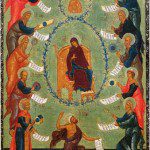![Crowning in Syro-Malabar Nasrani Wedding by Mar Gregory Karotemprel By Achayan (Own work) [CC BY 3.0 (http://creativecommons.org/licenses/by/3.0)], via Wikimedia Commons](https://wp-media.patheos.com/blogs/sites/637/2016/08/Crowning_in_Syro-Malabar_Nasrani_Wedding_by_Mar_Gregory_Karotemprel-1-300x229.jpg)
Marriage is good in part because it allows for the formation of a bond between a man and woman, bringing them together as one, with a unity which transcends their gender distinctions. It should help serve the reversal of the antagonist division of the sexes which emerged as a result of sin. St. Augustine, therefore, was able to see how the bond of love in marriage should be the foundation by which human society can be established, making marriage a fundamental good for society:
Therefore the first natural bond of human society is man and wife. Nor did God create these each by himself, and join them together as alien by birth: but He created the one out of the other, setting a sign also of the power of the union in the side, whence she was drawn, was formed. For they are joined one to another side by side, who walk together, and look together whither they walk. Then follows the connection of fellowship in children, which is the one alone worthy fruit, not of the union of male and female, but of the sexual intercourse.[2]
This natural progression of love between a couple to the willingness to have children gives us an understanding of the Trinity in both its immanent and economic forms. We can see the relations of the persons of the Trinity as a reflection of the different modalities of love: the internal relationships between the persons of the Trinity demonstrate the various ways love can be manifest (as is well explained by Richard of St. Victor), which then is able to be seen in the way a couple loves each other even as they love their children. But, by the way a couple desires children as an expression of their love, we can then understand God and his relation with us, that is, why he creates: love is generative.[3] God being love freely gives himself to the world, freely generating it as an act of love, and finally, he rejoices in the good which he has accomplished by his love.
Catholic teaching also tells us there is a holiness found in those who do not marry but remain celibate and chaste their whole life. Not everyone is called to be married or to have children. They should not be treated as inferiors, as secondary citizens who have failed their duty to society. They have not. Virginity imitates God in a different way, representing a purity which, when combined with grace, allows it to be a high form of holiness, as St. Ambrose among so many others declared: “And what is virginal chastity but purity free from stain? And whom can we judge to be its author but the immaculate Son of God, Whose flesh saw no corruption, Whose Godhead experienced no infection?”[4] St. Ambrose explained that virginity grants to those who hold onto it a kind of freedom which knows no commands, because there is no regulation on purity:
But let us now come down from the mother to the daughters. “Concerning virgins,” says the Apostle, “I have no commandment of the Lord.” If the teacher of the Gentiles had none, who could have one? And in truth he had no commandment, but he had an example. For virginity cannot be commanded, but must be wished for, for things which are above us are matters for prayer rather than under mastery. “But I would have you,” he says, “be without carefulness. For he who is without a wife is careful for the things which are the Lord’s, how he may please God….And the virgin takes thought for the things of the Lord, that she may be holy in body and in spirit. For she that is married takes thought for the things of the world, how she may please her husband.”[5]
![Saint Kateri Tekakwitha, a Catholic laywoman who took a private vow of perpetual virginity By Cmichael1977 (Own work) [CC BY-SA 3.0 (http://creativecommons.org/licenses/by-sa/3.0)], via Wikimedia Commons](https://wp-media.patheos.com/blogs/sites/637/2016/08/KateriTekakwitha-199x300.jpg)
By Cmichael1977 (Own work) [CC BY-SA 3.0 (http://creativecommons.org/licenses/by-sa/3.0)], via Wikimedia Commons
And yet, we should not, indeed must not, dismiss the virtues found in marriage nor think of them as insignificant. Several different kinds of virtue which develop in marriage which are found to be less or non-existent in the non-married, and these virtues have their own challenges and expectations. Even if the Church designates the chastity in virginity to be greater than this virtue when found in marriage, this does not mean those who are virgins, because they remain virgins, are holier than those who marry. Holiness is established by the appropriation of all virtues combined with the elimination of vices. If someone only appropriates one virtue and many vices, they will not be holy; the virtue is itself good but it is undermined by the vices, just as any good which is used to support and establish evil remains good in itself but is used against its nature and becomes less good than it should be.
With each virtue pursued, there are expectations for its proper formation. Thus, if someone marries, this does not mean anything is permissible in in the marriage bed; there are expectations, moral obligations, which come as a result of marriage. Those who are married are still expected to fight against lust, to hold themselves up to a higher standard than blindly following the passions wherever they should lead. Marriage is not a license to lust, but rather, it is a means by which it can be put under control and the true, higher ideal, love, is able to dethrone the power of lust in the married couple. [6]
What the Church teaches is that we are not to let our bodily desires and urges control us. We must regulate them through self-discipline. The passions themselves are not bad, indeed, they represent good natural desires, but we experience them in an unnatural mode of engagement, so they have become inordinate, controlling us instead of being moderated by other principles, and so ending up leading us astray. We should seek a virtuous life as a way of regulating and balancing out our actions. There are many virtues, of which chastity is but one which can be established and practiced both in marriage and in celibacy. It is seen that celibacy allows the virtue of chastity to be formed in a greater sense than in marriage because it requires greater struggles with greater risks, which is why the chastity which develops from it is greater if they are victorious in establishing the virtue in themselves. But this does not mean it will develop greater in celibacy and indeed, many fall away and “burn” as a result, while many take the path of chastity in marriage and end up greater in it than those who remain celibate because they allowed marriage to grant them their chastity.
And yet the holy life is not just about chastity. It is to be sure a virtue, and forming that virtue is important, but it is only one of many virtues which we can practice. Each virtue brings about its own form of holiness, and the more virtues which are formed, thanks to grace, the holier a person can be. Someone whose whole life is focused on the virtue of chastity in virginity does good, and should be commended; but if they, as a result, lose out to other temptations and sins, such as gluttony, then whatever they have gained can be lost from such neglect. Holiness develops in and through the union of all the virtues.
Virtue should connect with virtue and the formation should be holistic and balanced; this is not to say all virtues will be formed equally, but a denial of some of them with a development of great vices will result in spiritual harm. This is why even if someone lived and died a virgin, indeed, died to keep themselves a virgin, if they knew not love and the other virtues formed in that love, but are ill-tempered and mean to others, that virginity is not enough to qualify them as being heroic in sanctity. St. Paul indicated this quite well when he said, “If I give away all I have, and if I deliver my body to be burned, but have not love, I gain nothing” (1 Cor. 13:3 RSV). Holiness requires more than one virtue, but the development of all virtues in and through love, and through that love, vices themselves will also be able to be eliminated.
We recognize the holiness of chastity in and out of marriage; we recognize the challenges which come in our way as we try follow through with a holy life of chastity. In marriage, chastity still requires rules. It is not a free for all once we get married. Selfishness in and out of the marriage bed destroys the charity which opens us up to grace which is necessary for holiness. All things are not permissible because not all things come in and from love. Without charity, without love, chastity in marriage or out of it is nothing. With it, there is the foundation for a holy life. Marriage is a good, as is celibacy. Each are ways to engage holiness; celibacy allows one to practice the virtue of chastity in a way superior to that in marriage, but in marriage there are many other forms of virtues, many other temptations and trials available, so that even if chastity itself is not as strongly established, other virtues can be and are in a way which a celibate is not able to match. This is why it is wrong to assume marriage will not lead to the same level of sanctity as celibacy, but of course, by recognizing this, we should not ignore the special form of chastity in celibacy. Both deserve recognition for the special witness of holiness they bring into the world. Both are needed as witnesses of the goodness possible in a life of service to God.
[1] Sexual love is more than about procreation, though procreation is a way it can be seen to be active; lack of children is not proof it is inactive, just as having children is not proof it is.
[2] St. Augustine, “On the Good of Marriage” in NPNF1(3): 399.
[3] That generative nature of love is manifest in many forms in our life. Even if someone does not have children this does not mean they lack the generative ability and love. Much of what we do in the world can be done in and through this generative spirit. For example, artists can create out of a love for beauty itself, establishing as a result, more works of beauty. Likewise, politicians who seek to create a more just state love justice and what they do to establish that state could likewise be seen as a part of their generative gift to the world.
[4]St. Ambrose, “Concerning Virgins” in NPNF2(10): 366.
[5] Ibid., 367.
[6] Can does not mean will; the sacraments give the graces but how we interact and cooperate with them is up to us.
Stay in touch! Like A Little Bit of Nothing on Facebook:
A Little Bit of Nothing

















